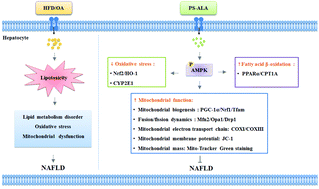Plant sterol ester of α-linolenic acid ameliorates high-fat diet-induced nonalcoholic fatty liver disease in mice: association with regulating mitochondrial dysfunction and oxidative stress via activating AMPK signaling
Abstract
The present study was designed to explore the beneficial mitochondrial effects and anti-oxidative activities of plant sterol ester of α-linolenic acid (PS-ALA) through AMP-activated protein kinase (AMPK) signaling in the treatment of nonalcoholic fatty liver disease (NAFLD) using in vivo and in vitro models. The mitochondrial function was evaluated and the oxidative stress index was measured. The protein expression was analyzed by immunohistochemical, immunofluorescence, and western blotting methods. The results showed that PS-ALA significantly suppressed NAFLD and alleviated steatosis in HepG2 cells induced by oleic acid (OA). In addition, PS-ALA promoted mitochondrial biogenesis, enhanced mitochondrial fatty acid oxidation capacity, improved mitochondrial dynamics, and restored mitochondrial membrane potential. Moreover, PS-ALA reduced reactive oxygen species production both in the liver tissue of HFD-fed mice and OA-loaded HepG2 cells. At the molecular level, PS-ALA accelerated the phosphorylation of AMPK and increased the protein expression of peroxisome proliferator-activated receptor-γ co-activator 1α (PGC-1α) and nuclear NF-E2-related factor 2 (Nrf2). Furthermore, the stimulating effects of PS-ALA on the PGC-1α/Nrf1/Tfam pathway and Nrf2/HO-1 pathway as well as its mitochondrial biogenesis promotion effects and anti-oxidative activities were abrogated by the AMPK inhibitor in OA-treated HepG2 cells. In conclusion, the protective effects of PS-ALA on NAFLD appear to be associated with improving mitochondrial function and oxidative stress via activating AMPK signaling.



 Please wait while we load your content...
Please wait while we load your content...